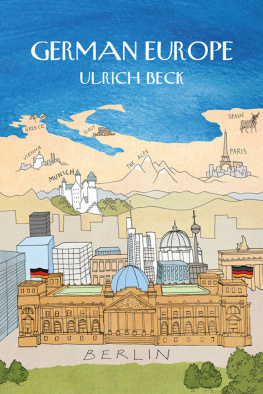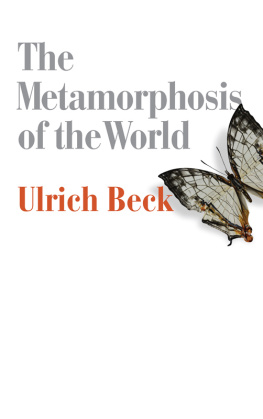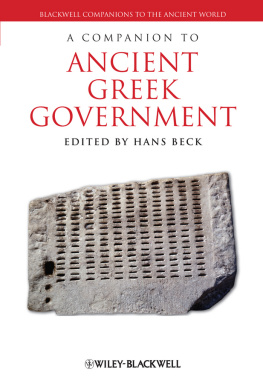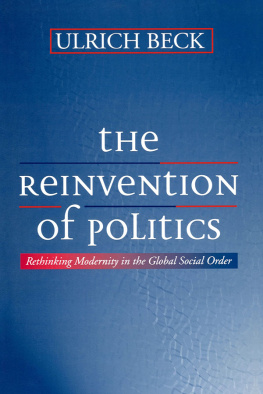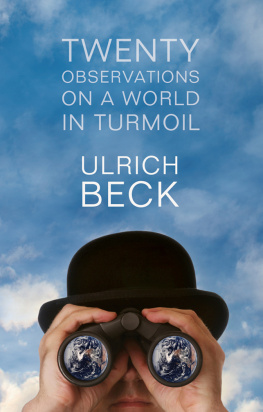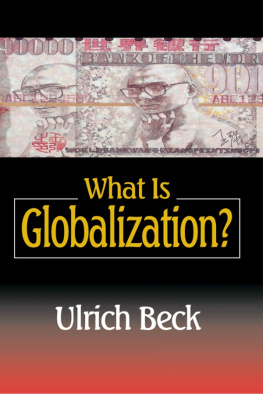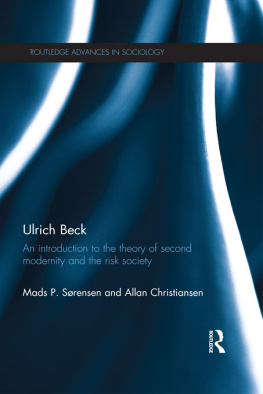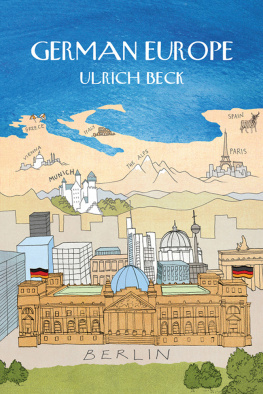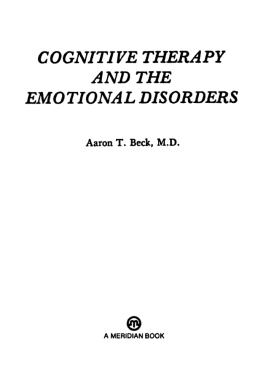Beck - German Europe
Here you can read online Beck - German Europe full text of the book (entire story) in english for free. Download pdf and epub, get meaning, cover and reviews about this ebook. year: 2013, publisher: John Wiley & Sons, Inc., genre: Politics. Description of the work, (preface) as well as reviews are available. Best literature library LitArk.com created for fans of good reading and offers a wide selection of genres:
Romance novel
Science fiction
Adventure
Detective
Science
History
Home and family
Prose
Art
Politics
Computer
Non-fiction
Religion
Business
Children
Humor
Choose a favorite category and find really read worthwhile books. Enjoy immersion in the world of imagination, feel the emotions of the characters or learn something new for yourself, make an fascinating discovery.
German Europe: summary, description and annotation
We offer to read an annotation, description, summary or preface (depends on what the author of the book "German Europe" wrote himself). If you haven't found the necessary information about the book — write in the comments, we will try to find it.
Beck: author's other books
Who wrote German Europe? Find out the surname, the name of the author of the book and a list of all author's works by series.
German Europe — read online for free the complete book (whole text) full work
Below is the text of the book, divided by pages. System saving the place of the last page read, allows you to conveniently read the book "German Europe" online for free, without having to search again every time where you left off. Put a bookmark, and you can go to the page where you finished reading at any time.
Font size:
Interval:
Bookmark:

For Elisabeth
First published in German as Deutsches Europa Suhrkamp Verlag Berlin 2012
This English edition Polity Press, 2013
Polity Press
65 Bridge Street
Cambridge CB2 1UR, UK
Polity Press
350 Main Street
Malden, MA 02148, USA
All rights reserved. Except for the quotation of short passages for the purpose of criticism and review, no part of this publication may be reproduced, stored in a retrieval system, or transmitted, in any form or by any means, electronic, mechanical, photocopying, recording or otherwise, without the prior permission of the publisher.
ISBN-13: 978-0-7456-6539-9
ISBN-13: 978-0-7456-6952-6 (Multi-user ebook)
ISBN-13: 978-0-7456-6953-3 (Single-user ebook)
A catalogue record for this book is available from the British Library.
The publisher has used its best endeavours to ensure that the URLs for external websites referred to in this book are correct and active at the time of going to press. However, the publisher has no responsibility for the websites and can make no guarantee that a site will remain live or that the content is or will remain appropriate.
Every effort has been made to trace all copyright holders, but if any have been inadvertently overlooked the publisher will be pleased to include any necessary credits in any subsequent reprint or edition.
For further information on Polity, visit our website: www.politybooks.com
Preface
Will the Greeks have returned to the drachma or the Germans to the D-Mark by the time readers pick up this book? Or will they simply laugh the idea out of court because the crisis will have long since been overcome and Europe will have emerged from it strengthened? The fact that we even ask such questions and that we seem to be stumbling around in a fog of uncertainty tells us a lot about the elusive state of affairs in Europe and the risk involved in attempting to capture it in words.
Everyone knows what that risk is but to utter it is to violate a taboo. The fact is that Europe has become German. Nobody intended this to happen, but, in the light of the possible collapse of the euro, Germany has slipped into the role of the decisive political power in Europe. Timothy Garton Ash summed up the situation in February 2012. In 1953 the novelist Thomas Mann appealed to an audience of students in Hamburg to strive for not a German Europe but a European Germany. This stirring pledge was endlessly repeated at the time of German unification. Today we have a variation that few foresaw: a European Germany in a German Europe.
How could this come to pass? What might its consequences be? What threats does the future hold? What are its attractions? These are the questions I propose to address in this essay.
At the present time, public debate on the subject is dominated almost exclusively by its implications for the economy. There is an irony here when we recall how the crisis took the economists by surprise. The problem created by a purely economic analysis is that it overlooks the fact that the crisis is not purely a matter of the economy (and of thinking about the economy) but is also one of society and politics and our prevailing ways of thinking about them. It is not that I am venturing onto the alien terrain of economics but that economics has lost sight of the society it is analysing.
My intention in this essay is to put forward a new interpretation of the crisis. I should like to try to get to the bottom of the announcements in the daily press or on TV and to set them in a broader context. The reading I offer is based on my theory of the risk society. The vision of a modernity that has gone out of control as I have presented it in a number of books is one I shall develop further here with reference to the crisis of Europe and the euro.
There is a widespread view that what we need to overcome this crisis is more Europe. But we find less and less assent to the idea of more Europe among the people of the member states. Given this situation, is it even possible to conceive of the completion of a European political union? Of a common taxation system and a common economic and social policy? Or is it not the reality that the preoccupation with a political union has obscured the crucial question, that of a European society, for so long that we have ended up leaving the most important factor out of the reckoning altogether? That factor is the sovereign people, the citizens of Europe. So let us put society back in. What needs to be done in the midst of this financial crisis is to shed light on the power shifts in Europe and to delineate the new landscape of power. That is the goal of this essay.
Ulrich Beck
August 2012
Note
(accessed September 2012).
Acknowledgements
I dedicate this little book to Elisabeth, my beloved wife, also known as Professor Beck-Gernsheim, for discussing its intellectual architecture with me sentence by sentence, and for her unpretentious sensibility to the way that words and sentences have a life of their own. Without John Thompson, my great colleague and dear friend, this book would never have been written. His power of inspiration made me do it. Rodney Livingstone, who loves and lives German and English literature, gave his imagination as a present and reinvented my argument for the English-speaking world, lending it a classical note, the aesthetics of truth.
Nevertheless, all that is wrong or missing is, of course, my responsibility entirely.
Introduction
Europe: To Be or Not to Be: The Decision Facing Germany
Today the German Bundestag will decide the fate of Greece. That was the announcement I heard on the radio at the end of February 2012. That was the day of decision on the second rescue package, which was tied to additional austerity measures as well as to the condition that Greece should accept a further loss of control over its own budget. Of course, I heard a voice in me saying, thats the way it is. The other voice in me asked incredulously how was that possible? What does it mean for one democratic state to decide the destiny of another democratic state? I understand that the Greeks need German taxpayers money, but the proposed cuts amount to an assault on the autonomy of the Greek nation.
What I found irritating at the time was not simply the substance of the announcement but also the fact that it was accepted in Germany as if it were the most natural thing in the world. Just listen to it again. The German parliament not the Greek parliament will decide the fate of Greece. How can that statement have any meaning at all?
Let us perform a small thought-experiment. Lets assume that the Germans were to hold a referendum on whether the Greeks should leave the euro now (i.e., the summer of 2012). The probable result would be Bye-bye, Acropolis.
How are we to go about resolving disagreements between national democracies? Which democracy should prevail? By what right? With what democratic legitimation? Or is the coercive might of the economy to play the key role? Should the withholding of credit be the ultimate decisive factor? Or should Greece, the original home of democracy, be shorn of its right to democratic self-determination because of its debt burden? What sort of country, what sort of world, what sort of crisis are we living in, if we can stand by and watch one democracy emasculated by another without its provoking any feeling of outrage? Moreover, the assertion that the German Bundestag will decide the fate of Greece understates the situation. It is Europe that is at stake here. The statement Today it is Germany that will decide on the existence or non-existence of Europe sums up the intellectual and political dilemma.
Font size:
Interval:
Bookmark:
Similar books «German Europe»
Look at similar books to German Europe. We have selected literature similar in name and meaning in the hope of providing readers with more options to find new, interesting, not yet read works.
Discussion, reviews of the book German Europe and just readers' own opinions. Leave your comments, write what you think about the work, its meaning or the main characters. Specify what exactly you liked and what you didn't like, and why you think so.

